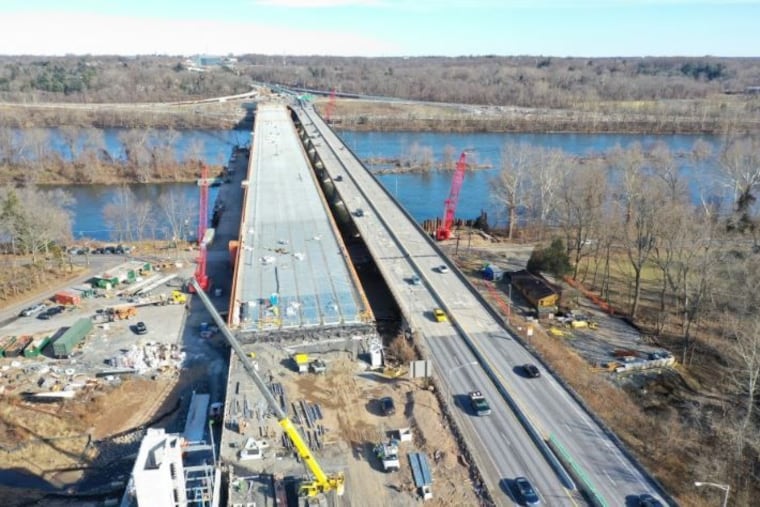Bridge agency faces damages for over-budget I-295 deal with Philly union contractor, court rules
Delaware River Joint Toll Bridge Commission had "no authority" to require bidders to work with Philadelphia and Trenton trade unions.

The bridge is built, carrying over 50,000 vehicles a day over the Delaware River near Trenton. The cost was tens of millions more than initially planned.
But the damages are still to be counted, a three-judge appeals panel of the New Jersey Superior Court ruled Thursday.
The two-state agency that controls most road crossings of the Delaware River between Pennsylvania and New Jersey had “no authority” when it set conditions favoring contractors using Philadelphia and Trenton labor unions as it sought bids for the bridge that carries I-295 over the Delaware River at Scudder Falls, the New Jersey appeals court ruled Thursday.
The court sent the case to a lower court to determine how much the Delaware River Joint Toll Bridge commission must pay George Harms Co., a Monmouth County, N.J.-based construction company, and members of a United Steel Workers construction local, who judges found were wrongly shut out of the job by illegal conditions the commissioner set for the job.
The commission acted “unlawfully,” Francis V. Cook, the Fox Rothschild LLP partner who led the contractor’s legal team, said Thursday. The lower court could require the commission to pay compensatory damages, punitive damages, and sanctions.
Cook noted his client had been prepared to do the job for $71 million less than the only bidder, Pittsburgh-based Trumbull Corp., agreed to charge. “Competition had been wrongly eliminated,” Cook said.
The bridge commission had no comment.
“Our union has always believed that the commission acted improperly” when it wrongly “excluded hardworking United Steelworkers members from the Scudder Falls Bridge project, and we are pleased the court agreed,” Del Vitale, director of United Steelworkers District 4, which includes the workers whose contractor was blocked from bidding, said in a statement.
Praised by Philly’s John Dougherty
The bridge deal was praised at the time by John J. Dougherty, the electrician who then headed the Philadelphia building trades union council contracted to Trumbull under a project-labor agreement. Dougherty has since stepped down and been convicted on federal bribery charges unrelated to the bridge job.
Dozens of contractors had sought to build the new Scudder Falls Bridge when it was announced in the mid-2010s. But after reviewing 1,800 requirements set by the commission, only one bid came in — from Trumbull Corp. in Pittsburgh.
Trumbull bid $396 million — $69 million over the cost estimated by the Delaware River Joint Toll Bridge Commission, which controls most of the road crossings between Pennsylvania and New Jersey from Trenton north to New York state.
Trumbull was the only contractor to accept the commission’s demand that the job include a project-labor agreement with the Philadelphia and Trenton building trades union councils, which include locals of the carpenters, ironworkers, electrical workers, and other construction unions.
The commission declined to rebid the job, as builders often do when a job comes in so much higher than expected with no competition.
Harms had a deal with a different labor union — Steelworkers Local 15024, with offices in Edison, N.J., which does construction work at sites along the East Coast.
In 2017, as the commission was setting conditions on bidders for the job, Harms complained that it could not make a deal with the Philadelphia and Trenton unions because it already had a contract with the Steelworkers. Why not allow other union labor, too? the firm asked.
The commission wouldn’t budge. When Harms threatened to seek a legal injunction delaying the deal, the commission sued the company, the first step in a six-year legal war leading up to Thursday’s decision.
The commission went beyond its legal authority in requiring the labor deal that favored some unions over others, the court ruled.
That’s because, while both Pennsylvania and New Jersey require competitive bidding and favoring the low bidder who can do the work as laid out in bids, the states don’t agree on extra conditions that the commission may add, so the commission lacked authority to impose them.
Since the commission lacked the power to add the labor deal as a condition, the deal was “void,” the court added.
The bid, $69 million over the estimated price, did not “benefit the people of the two states,” according to the decision.
Formerly free crossing now has toll
The previous Scudder Falls Bridge, built in the 1950s, was free to cross. It formerly carried I-95, which has since been rerouted along a new roadway farther south, connecting to the New Jersey Turnpike.
To pay for the new Scudder Falls Bridge, including its higher-than-expected price tag, the commission imposed its tolls for the first time — ranging from $1 for E-ZPass commuters (or $3 in “cashless” mail-in levies on other cars spied by surveillance cameras) to over $30 for the largest commercial tractor-trailers.
A state court in Mercer County threw out most of the commission’s case, as well as Harms’ counterclaims, for reasons including its finding that some claims were “moot” because the bridge was finished and opened to traffic in 2021.
On appeal, the five-judge panel found the high cost of the bridge and the way the commission exceeded its authority made the case of “great public interest” and “sufficient public importance” that it reinstated most of Harms’ claims.
Besides damages to the contractor and workers shut out by the commission’s high-handed action, the lower court must now reconsider whether the commission “breached its fiduciary duty” by accepting a price higher than it should have at the expense of bridge users.